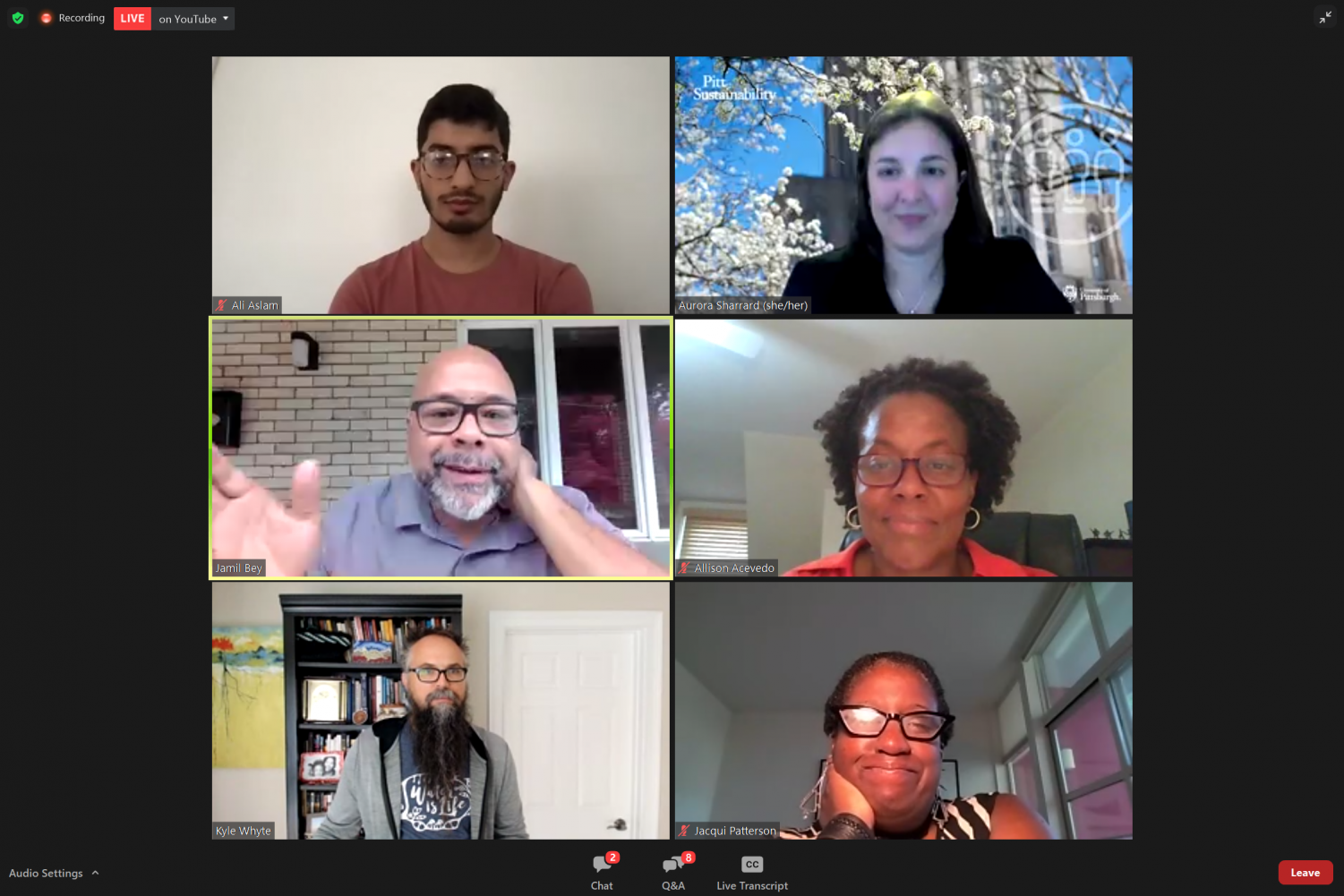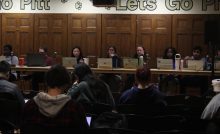Panelists discuss environmental hazards, ways to combat injustices


The Office of Equity, Diversity, and Inclusion hosted its “Combating Environmental Racism and Injustice” event on Thursday as part of Pitt’s annual Diversity Forum.
Jacqui Patterson said her friend’s son asked, “Mom, why are all the Black kids rich?” after noticing the “good stuff” — Doritos, Cheetos and other processed foods — in Black students’ lunches, and healthier foods — such as vegetables — in white students’ lunches.
Patterson said she recognized that even a young child was able to pick out the injustices that disproportionately affect communities of color, such as food insecurity, poor crop yields and lack of access to grocery stores.
“That was both a kind of bittersweet moment of the innocence of childhood, in terms of what he thinks is good,” Patterson, founder and executive director of the Chisholm Legacy Project, said, “and then also recognizing that even at six years old, he’s seeing the injustices that are pervasive in our society.”
As part of Pitt’s annual Diversity Forum — a week dedicated to discussing racial justice — the Office of Equity, Diversity and Inclusion hosted the event “Combating Environmental Racism and Injustice” on Thursday. Aurora Sharrard, Pitt’s director of sustainability, facilitated a panel of speakers who discussed their experiences with and perspectives on environmental justice.
Sharrard opened the event with a land acknowledgement and said Pitt occupies the ancestral land of the Adena culture, Hopewell culture and the Monongahela people.
“We honor these traditional Native inhabitants of this place, and uplift their historic, unique and enduring relationship with this land, which is their ancestral territory,” Sharrard said. “We pay our respects to their elders, and their past, present and future people, community and culture.”
Patterson, the event’s keynote speaker, said in order to commit to necessary systemic changes, we should understand the “pervasiveness, and the insidiousness and the intentionality” of current systems.
“It’s not just that the system is broken, it’s just that the system is doing exactly what it was designed and intended to do, and so we really need to fully grasp that in order to have the political will and commitment to make the changes that we need to make,” Patterson said.
According to Patterson, an African American family making $50,000 a year is more likely to live next to a facility producing or emitting toxins than a white American family making $10,000 a year. Toxic facilities release cognitive disruptors — such as lead and manganese — which Patterson said can lead to cognitive delays and increase students’ chances of future imprisonment.
“If you have all of those impediments, then you’re less likely to be on grade level by the third grade,” Patterson said. “Studies show that if you’re not on grade level by the third grade, you’re more likely to enter into the school to prison pipeline.”
Patterson said landfills and incinerators — which also are disproportionately located near communities of color — can emit known carcinogens such as cadmium and benzene, and coal burning emits sulfur dioxide, nitrogen oxide, mercury, arsenic and lead.
According to Patterson, families living near such facilities are often denied access to their use. She said a family from the Southwest was denied electricity — like 70% of people who live on Navajo land — despite having four coal plants within a 30-mile radius. While the nearby plants powered major cities such as Phoenix and Los Angeles, she said one family member died from respiratory illness due to poor air conditions caused by the nearby plants.
Patterson added that the 2017 NAACP Lights Out in the Cold report found that power and utility shut offs due to the inability to pay bills have led to death, while CEOs of the power companies are continuously growing their wealth.
Patterson said communities of color are “rising up,” growing their own food, having “green” schools, transitioning to systems that recycle and recover waste and using mass transportation.
Kyle Whyte — a member of the Citizen Potawatomi Nation, the people of the Great Plains and Anishinaabe territory, and professor of environment and sustainability at the University of Michigan — said energy industries’ definition of energy is “dominated by a resource-driven approach,” whereas Indigenous people view energy as the motion and flow of the environment, including wind, water, soil, plants or animals.
Whyte said using “Indigenous solutions,” energy can become renewable, responsible and restorative.
“In order to be able to build these responsible Indigenous economies, these low carbon footprints, these zero carbon footprints, Indigenous economies,” Whyte said, “we need to work with folks that understand the history of our relationship to infrastructure and understand the conditions that need to be met for Indigenous people to be leaders and to exercise sovereignty and to actually model what different sets of renewable nationhood, what responsible nationhood means.”
Allison Acevedo, director of the Pennsylvania Department of Environmental Protection’s Office of Environmental Justice, said she is engaging her staff through education to understand environmental justice issues. She said her team created the Environmental Justice Task Group to respond to community concerns, and incorporporated equity into policies and grants.
“We have to be prepared as an agency to be able to respond to and understand community concern, for we have been rooted in this public policy, public participation, thinking about how we can talk about, incorporate and consider equity,” Acevedo said.
Jamil Bey — founder and president of the UrbanKind Institute — an organization dedicated to empowering and supporting “over-burdened and under-resourced communities” — discussed the cumulative impact of discriminatory policies, and how seemingly unrelated problems can be related to environmental justice. Bey said low-income neighborhoods are targeted when building infrastructure because of years of disinvesting and redlining, leading to lower property values.
“When it comes time to invest — well, where should we build the highway, where should we put the incinerator, where should we put the recycling unit — let’s put all those things in the areas where property values are lowest,” Bey said. “Well, where are the property values the lowest? The lowest are in areas where we’ve disinvested and we redlined, and we’ve had policies that did not allow people to invest in their own spaces.”
Ali Aslam, a junior biology and psychology major, joined the panel as a representative from the Fossil Free Pitt Coalition. FFPC has run a yearslong campaign to pressure Pitt to divest its endowment from the fossil fuel industry, including a Cathedral of Learning sit-in and purchasing a billboard in South Oakland. Pitt’s Board of Trustees voted in February to follow recommendations from an ad-hoc committee, which includes reducing private holdings in fossil fuel exploration and production to zero by the end of 2035.
Aslam said many industries place the blame on individual consumers when it comes to contributing to climate change, when in reality, that isn’t the whole story.
“It’s just a convenient narrative to spin that individual people and their individual actions are responsible for what is being caused by massive, world-destroying industries, such as fast fashion, fracking or fossil fuels,” Aslam said. “The most important thing we can do as individuals, and as a community, is become involved as constituents in the voting process and become involved in, even down to the local and state levels.”
Patterson said people should not only resist what is wrong and hold governmental leaders accountable, but also advance what is right, including supporting local food movements, reclaiming the energy grid, as well as pushing for power and energy without pollution or injustice.
“This movement is advancing this framework, moving from an extractive economy to a living economy, as I said in the beginning,” Patterson said. “Which is everything from advancing to democracy, making sure that the leadership is who we need to make decisions, and that we’re also involved in holding them accountable for those decisions.”
Recent Posts
SGB addresses concerns about ICE presence on campus, hears SJP lawsuit against administration, approves governing code bill
At its weekly meeting on Tuesday at Nordy’s Place, Student Government Board heard concerns about…
ACLU of Pennsylvania sues Pitt over SJP suspension
The ACLU of Pennsylvania filed a federal civil lawsuit against the University of Pittsburgh and…
Marquan Pope: The ultimate shark
One of the most remarkable things about sharks is that an injury doesn’t deter them.…
Who Asked? // Do we really get a summer vacation?
This installment of Who Asked? by staff writer Brynn Murawski mourns the seemingly impossible perfect…
Notes From an Average Girl // Notes from my junior year
In this edition of Notes From an Average Girl, senior staff writer Madeline Milchman reflects…
Meaning at the Movies // The Power of the Movie Theater
In this edition of “Meaning at the Movies,” staff writer Lauren Deaton discusses her love…

